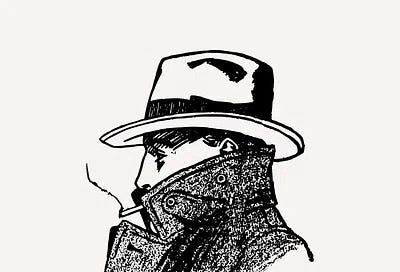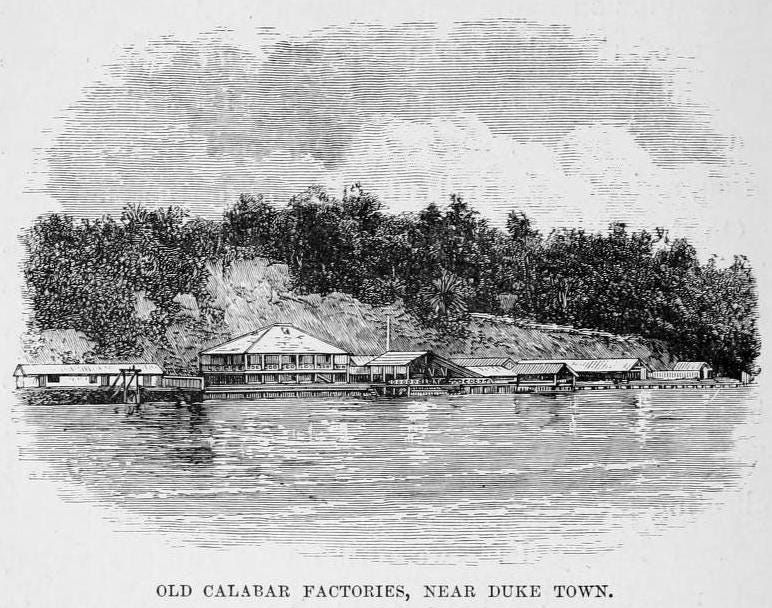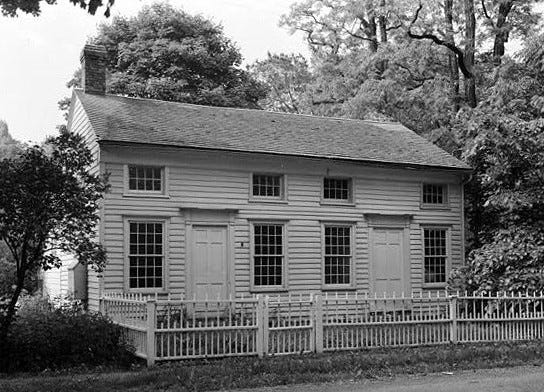Shadowing lovers across the Atlantic
Over the course of his career, one Liverpudlian detective got to dress as a vicar, and sail to New York - all as part of his job
This week, I'm looking at two of the cases dealt with by a relatively longstanding Liverpudlian private detective - Thomas Lucan.
Lucan claimed to have established his detective agency on South Castle Street (which no longer exists, sadly) in 1877, and although press reports of his career only date from the period c.1885-1890, the censuses of 1881-1901 all list him as a private inquiry agent - the common other title used for a private detective at this time.
Lucan was the son of a Lancaster coach trimmer and builder, and named for his father. He and his many siblings were all born in Preston, Lancashire. When he was around six years old, his mother died, and his father married a widow, Sarah Greenwood, back in Lancaster in 1855, when Thomas was nine.
By 1881, Thomas was living in Birkenhead with his wife, Susan, and their daughter Amy, who was two at this time. He and Susan would have two more children - Susan Dorothy and Rowland. He appears to have lived a quiet life in Birkenhead, with his detective business kept separate at South Castle Street.
Being based in Liverpool, Lucan dealt with cases revolving around the docks and ships, as well as with the more usual divorce cases. In 1885, he was employed by one Captain Lenty of London as part of a case involving a fatal collision at sea. The Luke Bruce barque had collided with the Dunango steamer on a clear night on 24 November 1884 (the news reports clearly state the name of the steamer as Dunango; the only steamer I can find is the Durango, built in 1895, and which sank in 1917). The Dunango had been returning from Old Calabar with a cargo of palm oil and ebony, when it crashed into the barque. Although the Luke Bruce was damaged, the Dunango sank. 24 people died.
Old Calabar factories, 1885
Richard and Thomas Jones were the Newport-based owners of the Dunango. They employed Captain Lenty to examine the crew of the Luke Bruce, which was now docked at Liverpool. Captain Lenty asked Thomas Lucan to assist him, his job being to find out how many of the Luke Bruce's men were going to be retained as witnesses for their employer in the forthcoming case, and to then commit the others to being witnesses for the Dunango's owners.
Lucan had unusual methods. In order that the crew wouldn't realise who he was, or get suspicious of his questioning, he dressed up as a clergyman. This may have got him results, but in the subsequent collision case heard at the Admiralty Court in London, it made him the subject of criticism, with one barrister muttering: "If they employed a private detective, they ought not to have sent him about in the dress of a clergyman", and a second stating, "I think it is an indecorous thing to dress up a detective as a clergyman". Because of this, when Lucan was called to be a witness, there was laughter in court, and the Luke Bruce's counsel refused to ask him any questions.
The Dunango was found to be solely to blame for the collision, despite crew insisting that the Luke Bruce's lights hadn't been visible to them. And Thomas Lucan had a wasted trip to London.
Five years later, there was a more typical case for Lucan to deal with, but one that involved more exciting travel than the collision case. Harriet Frances Swan had married a Newcastle solicitor, Charles Edward Milvain, in 1883. She soon found out that he had a fondness for drink and a dislike for marriage. Within two years he had walked out on her, and for the next three years, there was a pattern of him disappearing for long spells and then returning with no explanation. Harriet's wealthy father, John Cameron Swan, was concerned about his daughter's physical and mental health as a result of her husband's treatment of her, and when he received an anonymous letter making allegations that Milvain was seeing another woman, he decided to do something about it.
In March 1890, he employed Thomas Lucan to investigate, pointing out his son-in-law so that Lucan would be able to identify him. Lucan shadowed Milvain from Newcastle back to Liverpool, and then saw him board the transatlantic ship Teutonic with a lady. Lucan duly boarded the ship as a passenger, and on the voyage to New York, cultivated a friendship with Milvain. The errant husband introduced the lady he was with, Agnes Hall, as his 'future wife'. On arrival at New York, Lucan continued to shadow Milvain to Chatham, NY, where he saw the couple take a single bedroom at the Windsor Hotel, despite not being married.
Old Chatham, NY. Milvain took his mistress to Chatham - followed by a private detective…
Lucan had taken with him an assistant, Mr Wells, and the next morning, the detectives walked into Milvain's bedroom, where they found him and his lover in their nightdresses. Lucan told Milvain who he was, and Milvain responded, "I suppose you have been engaged by Mr Swan". Milvain was then served with divorce papers by Thomas Lucan.
Lucan's evidence resulted in a divorce for the Milvains. Harriet gained custody of the couple's only child, Charles, and remarried, having four more children by her second husband. Lucan, meanwhile, returned to Birkenhead. When his daughter Amy, a graduate of what would become Manchester University, and a teacher, married a unitarian minister, Thomas retired, and he and his wife Susan moved in with their daughter and son-in-law in Wakefield. He then seems to have moved to Manchester, where he died in 1919.
Thomas Lucan appears to have been an experienced and creative private detective, who worked on a variety of cases. His work took him to America; it also required him to give evidence in different courts. The news stories that appear about him in the press sound interesting and probably contributed to the desire of ordinary people to become private detectives: his work, his disguises, and his transatlantic travels to track down an adulterer would have appealed to the ordinary newspaper reader.






